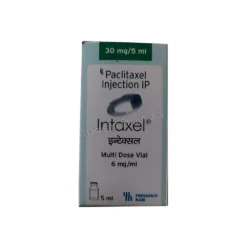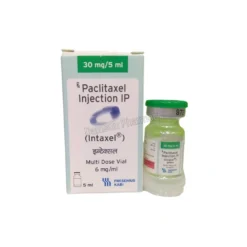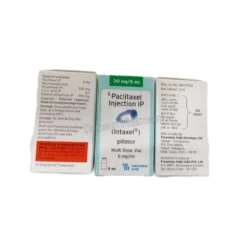Paclitax 30mg Injection
$130.00 – $550.00Price range: $130.00 through $550.00
| Pack Size | Price | Price / Unit | Quantity | |
|---|---|---|---|---|
| 1 Injection | $130.00 | $130.00/ unit | ||
| 3 Injections | $360.00 | $120.00/ unit | ||
| 5 Injections | $550.00 | $110.00/ unit |
Looking for bulk / B2B pricing? | Send Inquiry |

| SKU | 11402 |
| Manufacturer | Fresenius Kabi India Pvt Ltd |
| Categories | Anti Cancer |
| Delivery Time | 10 - 14 Working Days |
| Strength | 30mg |
Introduction to Paclitax 30mg Injection
Paclitax 30mg Injection is an anti-cancer medication commonly prescribed for the treatment of various types of cancer, including breast, ovarian, and lung cancers. It belongs to a class of chemotherapy drugs used under strict medical supervision in hospital or clinical settings.
This injectable medicine is administered by a healthcare professional through an intravenous (IV) route. Paclitax 30mg is carefully dosed based on individual factors like body surface area, type of cancer, and overall health condition of the patient.
Patients receiving Paclitax 30mg Injection are monitored closely for their response and any potential complications. Regular blood tests and clinical assessments are usually required to ensure safety and effective treatment progression.
Uses of Paclitax 30mg
- Breast Cancer
- Ovarian Cancer
- Non-Small Cell Lung Cancer (NSCLC)
- Kaposi’s Sarcoma
- Other Solid Tumors
How Does Paclitax 30 Works?
Paclitax 30mg Injection works by interfering with the normal function of microtubules in cells, which are essential for cell division. By stabilizing these structures, it prevents cancer cells from dividing and multiplying, effectively slowing down or stopping the growth of tumors.
This targeted action makes Paclitax 30mg particularly useful in treating rapidly dividing cancer cells. Its ability to disrupt the cancer cell cycle helps shrink tumors and control the spread of disease, especially when used as part of a combination chemotherapy regimen under medical supervision.
Side Effects of Paclitax 30mg
- Hair Loss (Alopecia)
- Nausea and Vomiting
- Fatigue
- Low Blood Cell Counts
- Joint and Muscle Pain
- Peripheral Neuropathy
- Diarrhea or Mouth Sores
- Allergic Reactions
Dosage of Paclitax 30mg
The dosage of Paclitax 30mg Injection depends on several factors including the type of cancer being treated, the patient’s body surface area (BSA), overall health, and response to therapy. It is typically calculated in milligrams per square meter (mg/m²) by the oncologist.
Paclitax 30mg is administered intravenously, usually over a period of several hours under strict medical supervision. It may be given once every one to three weeks, depending on the specific treatment regimen. Pre-medication is often required to reduce the risk of allergic reactions during infusion.
Other Dosages of Paclitax
How to Manage Side Effects?
- Always follow your doctor’s instructions and take paclitaxel as prescribed.
- Discuss potential side effects with your healthcare provider before starting treatment.
- Report any side effects you experience to your doctor promptly.
- Stay hydrated by drinking plenty of fluids unless otherwise instructed by your doctor.
- Eat a balanced and nutritious diet to support your overall health and well-being.
- Engage in light physical activity if you feel up to it, but avoid strenuous exercise during treatment.
Warnings & Precautions
1. Administered by Professionals Only:
- Paclitax must be given by trained medical personnel in a controlled clinical setting to ensure safety during infusion.
2. Pre-Medication is Essential :
- Patients are usually given antihistamines, corticosteroids, or antacids before infusion to prevent severe hypersensitivity reactions.
3. Monitor Liver Function:
- Liver function tests should be conducted regularly, as impaired liver function can affect how the drug is metabolized.
4. Use with Caution in Neuropathy:
- If the patient has a history of nerve-related issues, extra caution is needed to avoid worsening symptoms.
5. Avoid During Pregnancy and Breastfeeding:
- Paclitax can harm an unborn baby and is not recommended during pregnancy or lactation.
6. Contraception Required:
- Both male and female patients should use effective contraception during treatment and for some time after to prevent potential harm to a developing fetus.
7. Interactions with Other Drugs:
- Inform your doctor about all current medications, as Paclitax can interact with other chemotherapy agents or treatments.
Storage
- Keep Paclitax in a cool, dry place, away from direct sunlight and heat sources.
- Freezing can damage the contents and affect the medication’s stability and effectiveness.
- Store the vial in its original carton to protect it from light and maintain sterility.
- Always store the injection securely to prevent accidental exposure or ingestion by children.
- Do not use Paclitax after the expiration date mentioned on the label or packaging.
- Dispose of unused or expired medicine according to hospital guidelines or local biomedical waste disposal rules.
Frequently Asked Questions
1. Can Men Use Paclitax 30 Safely During Fertility Planning?
Ans. Men undergoing treatment with Paclitax 30 are advised to use contraception during therapy and for a few months after, as the drug can affect sperm and may cause harm to a future baby. Sperm banking may be considered before starting treatment.
2. Does Paclitax 30 Require Any Pre-Medications Before Use?
Ans. Yes, patients are often given pre-medications such as corticosteroids, antihistamines, and antacids before receiving Paclitax 30 to reduce the risk of hypersensitivity or infusion-related reactions during treatment.
3. Can I Eat Normally While Receiving Paclitax 30?
Ans. While most patients can maintain a normal diet during treatment with Paclitax 30, it’s advisable to eat light, nutritious meals. Consult your doctor or a dietitian to manage appetite changes or digestive issues that may occur during therapy.
4. Is Paclitax 30 Effective For All Types Of Cancer?
Ans. Paclitax 30 is commonly used for treating breast cancer, ovarian cancer, lung cancer, and Kaposi’s sarcoma. However, its use depends on the specific cancer type and the stage of the disease, and it may not be suitable for all cases.
| Pack Size | 1 Injection, 5 Injections |
|---|---|
| Price/Unit | $110/unit, $120/unit, $130/unit |








Reviews
There are no reviews yet.